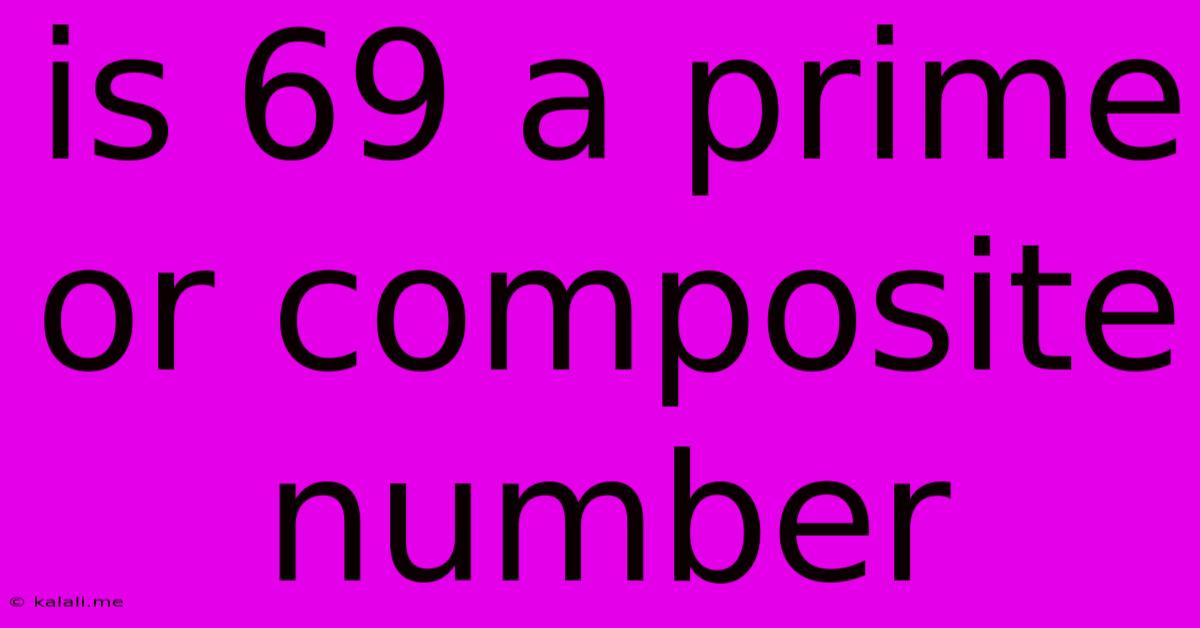Is 69 A Prime Or Composite Number
Kalali
May 09, 2025 · 2 min read

Table of Contents
Is 69 a Prime or Composite Number? A Quick Guide to Number Classification
Is 69 a prime number or a composite number? This seemingly simple question touches upon fundamental concepts in number theory. Understanding the difference between prime and composite numbers is crucial for various mathematical applications. This article will not only answer the question definitively but also provide you with a clear understanding of how to classify numbers.
What are Prime and Composite Numbers?
Before we delve into the classification of 69, let's define our key terms.
-
Prime numbers: A prime number is a whole number greater than 1 that has only two divisors: 1 and itself. Examples include 2, 3, 5, 7, 11, and so on. Prime numbers are the building blocks of all other whole numbers.
-
Composite numbers: A composite number is a whole number greater than 1 that has more than two divisors. This means it can be divided evenly by numbers other than 1 and itself. Examples include 4, 6, 8, 9, 10, and so on.
Determining if 69 is Prime or Composite
To determine whether 69 is prime or composite, we need to check if it's divisible by any whole number other than 1 and 69. We can start by checking small prime numbers.
- Divisibility by 2: 69 is not divisible by 2 because it's an odd number.
- Divisibility by 3: The sum of the digits of 69 is 6 + 9 = 15. Since 15 is divisible by 3, 69 is also divisible by 3 (69 / 3 = 23).
Since 69 is divisible by 3 (and 23), it has more than two divisors (1, 3, 23, and 69).
Therefore, 69 is a composite number.
Understanding Divisibility Rules
Knowing divisibility rules can significantly speed up the process of determining whether a number is prime or composite. Here are a few helpful rules:
- Divisibility by 2: A number is divisible by 2 if its last digit is even (0, 2, 4, 6, or 8).
- Divisibility by 3: A number is divisible by 3 if the sum of its digits is divisible by 3.
- Divisibility by 5: A number is divisible by 5 if its last digit is 0 or 5.
- Divisibility by 10: A number is divisible by 10 if its last digit is 0.
By applying these rules, you can quickly eliminate many potential divisors and efficiently determine the prime or composite nature of a number.
Conclusion
In conclusion, 69 is a composite number because it has more than two divisors. Understanding the definitions of prime and composite numbers, along with divisibility rules, is essential for various mathematical operations and problem-solving. This knowledge provides a foundational understanding of number theory and its applications in more complex mathematical concepts.
Latest Posts
Latest Posts
-
4 Indicators Of A Chemical Reaction
May 09, 2025
-
How Many Cups Of Water Equals 4 Quarts
May 09, 2025
-
170 Out Of 200 Is What Percent
May 09, 2025
-
Which Enzyme Breaks The Hydrogen Bonds During Replication
May 09, 2025
-
How Much Kg Is 20 Pounds
May 09, 2025
Related Post
Thank you for visiting our website which covers about Is 69 A Prime Or Composite Number . We hope the information provided has been useful to you. Feel free to contact us if you have any questions or need further assistance. See you next time and don't miss to bookmark.